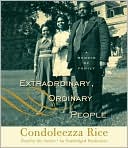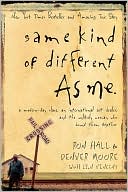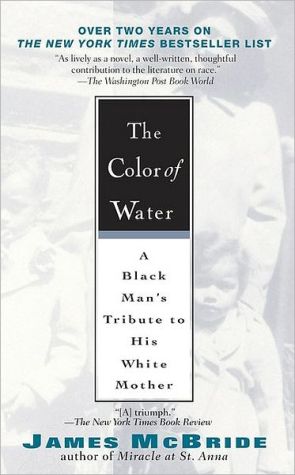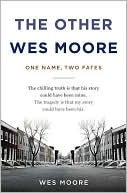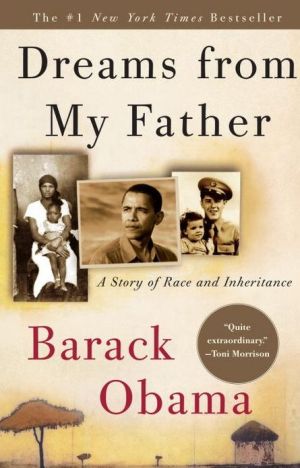Extraordinary, Ordinary People: A Memoir of Family
Search in google:
Condoleezza Rice has excelled as a diplomat, political scientist, and concert pianist. Her achievements run the gamut from helping to oversee the collapse of communism in Europe and the decline of the Soviet Union, to working to protect the country in the aftermath of 9-11, to becoming only the second woman - and the first black woman ever — to serve as Secretary of State. But until she was 25 she never learned to swim. Not because she wouldn't have loved to, but because when she was a little girl in Birmingham, Alabama, Commissioner of Public Safety Bull Connor decided he'd rather shut down the city's pools than give black citizens access. Throughout the 1950's, Birmingham's black middle class largely succeeded in insulating their children from the most corrosive effects of racism, providing multiple support systems to ensure the next generation would live better than the last. But by 1963, when Rice was applying herself to her fourth grader's lessons, the situation had grown intolerable. Birmingham was an environment where blacks were expected to keep their head down and do what they were told — or face violent consequences. That spring two bombs exploded in Rice’s neighborhood amid a series of chilling Klu Klux Klan attacks. Months later, four young girls lost their lives in a particularly vicious bombing. So how was Rice able to achieve what she ultimately did? Her father, John, a minister and educator, instilled a love of sports and politics. Her mother, a teacher, developed Condoleezza’s passion for piano and exposed her to the fine arts. From both, Rice learned the value of faith in the face of hardship and the importance of giving back to the community. Her parents’ fierce unwillingness to set limits propelled her to the venerable halls of Stanford University, where she quickly rose through the ranks to become the university’s second-in-command. An expert in Soviet and Eastern European Affairs, she played a leading role in U.S. policy as the Iron Curtain fell and the Soviet Union disintegrated. Less than a decade later, at the apex of the hotly contested 2000 presidential election, she received the exciting news – just shortly before her father’s death – that she would go on to the White House as the first female National Security Advisor. As comfortable describing lighthearted family moments as she is recalling the poignancy of her mother’s cancer battle and the heady challenge of going toe-to-toe with Soviet leaders, Rice holds nothing back in this remarkably candid telling. This is the story of Condoleezza Rice that has never been told, not that of an ultra-accomplished world leader, but of a little girl – and a young woman — trying to find her place in a sometimes hostile world and of two exceptional parents, and an extended family and community, that made all the difference.Publishers WeeklyFormer secretary of state Rice only briefly treats her tenure during the second Bush administration in favor of a straightforward, reverential chronicle of her upbringing under two teachers in the segregated Deep South. Rice acknowledges upfront the complicated, intertwined history of blacks and whites in America, which lent a lightening of skin to her forebears that was looked upon favorably at the time. Her father, John Wesley Rice Jr., came from a family of well-educated itinerant preachers in Louisiana, while the family of her mother, Angelena Ray, were Birmingham, Ala., landowners; both were teachers at Fairfield Industrial High School and determined to live "full and productive lives" in Birmingham, despite the blight of segregation (e.g., poll tests in the largely Democratic South resolved John Rice to become a lifelong Republican). Cocooned in an educational and musical environment, Rice was a high-achieving only child. Yet the encroaching racial tension broke open in Birmingham in the form of store boycotts, bombings, and demonstrations. Eventually, the family moved to Denver, where Rice attended the university, majoring first in piano then political science, due to the influence of professor and former Czech diplomat Josef Korbel. Rice moves fleetingly through her subsequent education at Notre Dame and Stanford. Swept into Washington Republican politics by Colin Powell and others, she sketches the "wild ride" accompanying the Soviet Union's demise, but overall records a thrilling, inspiring life of achievement. (Oct.)
Author's NoteOne Starting Early 1Two The Rays and the Rices 7Three Married at Last 20Four "Johnny It's a Girl!" 32Five "I Need a Piano!" 40Six My Parents Were Teachers 49Seven Something in the Water 59Eight School Days 70Nine Summer Respite 78Ten Turning Up the Heat in Birmingham 83Eleven 1963 88Twelve Integration? 104Thirteen Tuscaloosa 110Fourteen Denver Again 120Fifteen Leaving the South Behind 131Sixteen Cancer Intrudes 142Seventeen Starting Early (Again) 147Eighteen College Years 154Nineteen A Change of Direction 159Twenty "Rally, Sons (and Daughters) of Notre Dame" 168Twenty-One A New Start 173Twenty-Two A Lost Year 182Twenty-Three Senator Stanford's Farm 189Twenty-Four My Rookie Season 202Twenty-Five The Darkest Moment of My Life 215Twenty-Six "The Moving Van Is Here" 223Twenty-Seven Inside the Pentagon 230Twenty-Eight Back to Stanford 239Twenty-Nine D.C. Again 244Thirty "I Don't Think This Is What Karl Marx Had in Mind" 254Thirty-One Back in California 271Thirty-Two Learning Compassion 276Thirty-Three Finding a New President for Stanford 282Thirty-Four Provost of the University 287Thirty-Five Tough Decisions 293Thirty-Six The Governor's Campaign 311Thirty-Seven Florida 318Thirty-Eight "The Saints Go Marching In" 322A Note on Sources 327Acknowledgments 330Index 334
